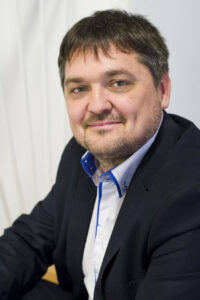The man just received his 25th diploma in Szeged today.
On July 3, Krisztián Kapus will receive his twenty-fifth degree from the University of Szeged (SZTE), where he obtained his first many years ago. He told Index: he considers himself to be a teacher who teaches life, especially young people. The man living in Bács-Kiskun county revealed that studying is a hobby for him, on which he has already spent many millions of forints. "Some play tennis, some hunt. I quench my thirst for knowledge as a hobby," said the diploma recorder.
"I've already spent more than HUF 10 million on tuition fees," Krisztián Kapus, who views studying as a hobby, told Index "Some play tennis, some hunt, some climb mountains. All such hobbies have serious costs. People spend a lot on it. I don't think they look at whether it pays off," he answered the question about what kind of investment learning is, whether it's worth devoting money and time to it.
I quench my thirst for knowledge as a hobby
added the father of three.
The diploma king introduces himself as a teacher
On July 3rd, Krisztián Kapus will receive his twenty-fifth degree in Szeged, at the SZTE, where he obtained the "Roma integration studies" teacher examination qualification. He obtained his twenty-fifth degree where he also obtained his first: at the Gyula Juhász Faculty of Teacher Education, which operates within the framework of SZTE.
When asked which of the twenty-five diplomas he is most proud of, the specialist, who currently works in the social sphere and deals with communication consulting and adult education, answered: his highest qualification is a PhD. He graduated from the Doctoral School of Clinical Neurosciences in Pécs, and that's what he's most proud of. The other is his diploma in Catholic theology, because faith is very important to him. Krisztián Kapus likes to work with young people and among young people, which is why he is close to his "youth expert" qualification, which he obtained at the University of Pécs. We learned that the Hungarian, library and Russian teacher majors are also among the trophies.
Dr. Kapus always chooses a new major based on what interests him, or whether he finds a course in a particular program in which he would like to delve more deeply into the topic.

Krisztián Kapus/Facebook
As we found out, he is also ready for his twenty-sixth diploma, because he is already a student at Eszterházy Károly Catholic University, where he is majoring in care policy management.
"I am a teacher. I learn about people and teach them about life, especially young people," answered Krisztián Kapus about how he introduces himself when he meets strangers.
Learning is useful, but not only because we use our brain circuits, but also because the world is constantly changing. Our acquired knowledge must also be constantly updated
- said the fifty-year-old specialist, who believes that lifelong learning is not only about graduate university courses. There are also informal and non-formal training courses, which means that you can study adult courses and trades as well. Krisztián Kapus considers it important that a lot can be learned from the life experiences of older people. It is worth listening to them, hearing their wisdom.
Learning as a life strategy
"Nowadays, career building cannot be considered linear, instead of a continuous development curve, there are interruptions and jumps. Career building is now characterized by continuous adaptation to changing environmental conditions," Réka Török told Index. According to the career consultant, the employee must be much more flexible and adaptable in accordance with environmental conditions and changes in technology.
This means a lot of retraining, i.e. obtaining new qualifications, as professional knowledge becomes obsolete much sooner than before. Those thinking about changing careers are also more committed to obtaining a new qualification.
Continuous learning can also become a life strategy: the need for self-education is ideally permanently present in the individual life path
- said the psychologist.
According to the career consultant, in Hungary, changes in the labor market and the desire for a better career opportunity determine whether someone obtains an additional degree, rather than the expectations of the culture. Of course, there are also many people who are not fueled by the need to change, to acquire additional qualifications, but by the desire for additional knowledge, development, and lifelong learning. This results in individuals moving beyond traditional occupational boundaries, such as when a teacher becomes a trainer at a company, or when someone leaves a job and goes back to university.
According to Réka Török's experience, it can be seen as a trend that more and more people are appearing in teacher training and helping professions (e.g. psychology, special pedagogy) in the years after having children, so the graduation is pushed to the age of 30 or even 40.
Those who work alongside family and work mostly appear in part-time higher education courses and correspondence work schedules.
When Z, Y, X and the baby boomer generation are present together
"Going into graduation with an older head? Its advantages: with much more experience, they jump into their studies with more confidence, and since they probably also work alongside it, they are more focused and pay more attention to time management."
- said the psychologist, who added: it can be a disadvantage that you have to get to know a lot of new software, and the majority of colleagues are still in their 20s, so building a network of relationships is more difficult, not to mention if the students are even older than the instructors student.
In order for older people to be able to join university studies, the education system must be flexible and prepared for this. Educational institutions must also constantly update their curriculum to meet the current needs of the labor market.
In Hungary, there is also the potential for the continuation of university studies to spread among pensioners, but this requires appropriate support, for example support for the acquisition of digital skills, since the continuation of studies is now carried out using web-based methods and online. In addition, it is necessary to support the cooperation of different generations, since the Z, Y, X and baby boomer generations are present together in a university group. According to Réka Török, the values, goals, and learning styles of the generations differ from each other, and these differences affect communication, cooperation, and last but not least, career development opportunities.
Featured image: karriertrend.hu













